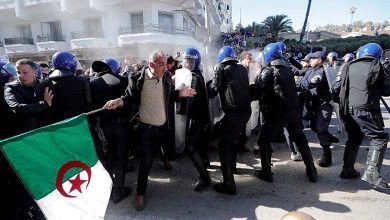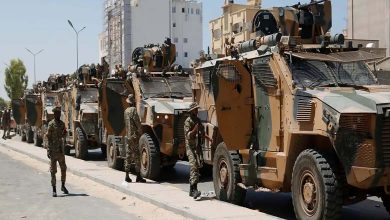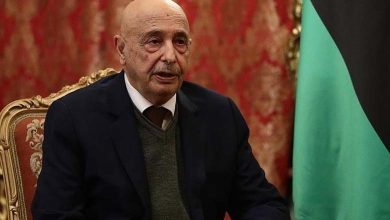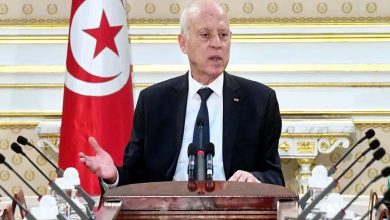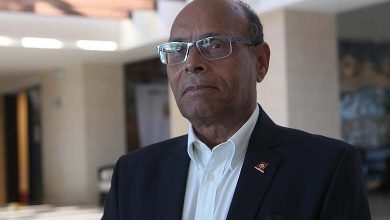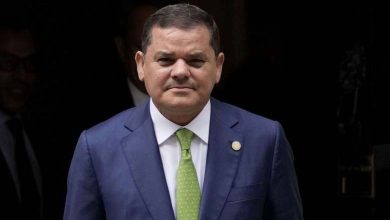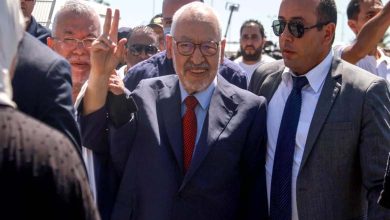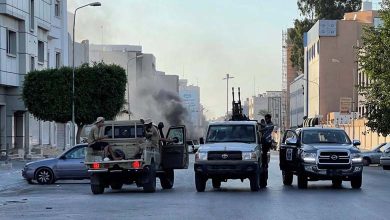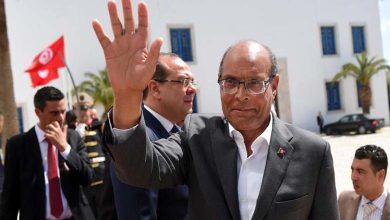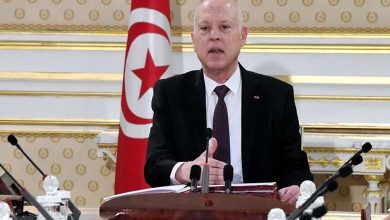Tunisian judiciary upholds prison sentence for Ghannouchi and his son-in-law

The confirmation of the sentence against Ghannouchi and his son-in-law comes shortly after a similar decision to extend the detention of the acting head of the Ennahdha Movement and his referral for investigation in terrorism cases
The Tunis Court of Appeals has upheld the initial ruling sentencing the leader of the Islamic Ennahdha Movement, Rached Ghannouchi, and his son-in-law, former Foreign Minister Rafik Bouchlaka, to three years in prison in the case related to the movement’s foreign funding. Additionally, the detention of Mondher Ounissi, acting head of the movement, was extended, and he was referred for investigation on terrorism-related charges.
Local radio “Mosaïque” reported, citing the official spokesperson of the Tunis Court of Appeals, that “the criminal chamber of the Tunis Court of First Instance had sentenced Ghannouchi and Bouchlaka last February to three years in prison with immediate execution and fined the Ennahdha Movement an amount equivalent to the foreign funding received, amounting to $1,170,478.35.”
The same source added that “the public prosecutor appealed the initial judgment, and the criminal chamber of the Tunis Court of Appeals today, Friday, upheld the initial ruling.”
Ghannouchi has been in prison since mid-April of last year, and the Tunisian judiciary has issued three detention orders against him in several cases, including those related to terrorism and the case known as the “conspiracy against state security.” His lawyers previously stated that some penalties could reach the death sentence.
Earlier on Friday, the indictment chamber of the Judicial Counter-Terrorism Pole in Tunisia rejected the release request of the acting head of the Ennahdha Movement, Mondher Ounissi, and referred him to the criminal chamber specialized in terrorism cases at the Tunis Court of First Instance.
Ounissi has been detained since September 2023 in the high-profile “audio leaks” case and his personal connections with several influential businessmen. He is accused of failing to report the commission of terrorist crimes and establishing links with foreign parties to harm the interests of the Tunisian state.
The audio leaks involving the vice president of the Ennahdha Movement caused significant controversy in Tunisian political circles, as he discussed internal conflicts among the movement’s leaders for the party’s presidency in the next phase and accused individuals close to Ghannouchi of receiving foreign funds and using them to resolve these internal conflicts.
The audio recording also included discussions about leaders of the movement seeking alliances with businessmen in preparation for upcoming political milestones.
The first investigating judge of the Judicial Counter-Terrorism Pole had issued a detention order against Ounissi due to an attributed audio recording and later extended his preventive detention before deciding to close the investigation and refer him to the indictment chamber for charges related to failing to report terrorist crimes and establishing links with foreign parties to harm the interests of the Tunisian state.
Ounissi’s lawyers appealed the decision to close the investigation, but the indictment chamber decided to uphold it and referred Ounissi to the criminal chamber specialized in terrorism cases at the Tunis Court of First Instance, while also refusing to release him.
Ounissi is one of the Ennahdha leaders being prosecuted on various charges, some of which have already resulted in judgments, while others are still ongoing. Last February, the financial corruption specialized chamber of the Tunis Court of First Instance sentenced Ennahdha party leader Rached Ghannouchi and his son-in-law Rafik Abdessalem Bouchlaka to three years in prison for accepting foreign donations to finance their election campaign.
In addition to Ghannouchi, several senior Ennahdha leaders are imprisoned facing various suspicions, including “conspiracy against state security” and “involvement in networks sending fighters to conflict zones”, among them vice-presidents Noureddine Bhiri and Ali Larayedh.
The investigating judge in the lobbying case had previously decided to refer the Ennahdha party, in the person of its legal representative and one of its leaders involved in the sponsorship contract, to the criminal chamber of the Tunis Court of First Instance for “obtaining foreign funding for an election campaign and accepting direct funding from an unknown source”.
The Tunis Court of First Instance stated in a communiqué that “the investigation into the funding of the 2019 legislative election campaign, known as the lobbying case, was concluded on March 11, 2022”.
Ennahdha did not comment on the refusal to release Ounissi, but tried to divert attention from the case by issuing a statement on recent developments in the country and criticizing the authorities, as is always the case on any occasion that can be politically exploited to attack the government.
Ennahdha sharply criticized the authorities in its statement, expressing its “deep concern over the state of political life in our country marked by abuses, deadlock, restrictions on freedoms, trampling on rights, an increase in arrests and trials, and the repression of media, political parties, associations, and civil society in general”.
The movement also attacked the judiciary and questioned its integrity, stating that “recent serious developments and recorded abuses confirm the worsening crisis that has struck the judicial system”.
“The authorities have violated the principle of a fair trial and the presumption of innocence”, pointing out what the legal profession has experienced due to “the escalating measures by the authorities following the occupation of the Bar Association by Chairman Chokri Tbib and lawyer Sonia Dahmani and the arrest of journalists Borhen Bsaies and Mourad Zghidi”.
Observers believe that the Ennahdha movement, going through a major crisis due to the serious accusations against its top leaders and members, finds no other means of defense but attack, especially with voices calling for the dissolution of the party after it was proven to have received foreign funding during the elections.
The president of the Alliance for Tunisia Party, Sarhan Nasri, called last February on the authorities to “dissolve the movement and ban its activities permanently, after it was proven that it received foreign funding in clear violation of the country’s party law”.
In turn, the official spokesman of the Popular Current Party, Mohsen Nabti, stated that the “lobbying” file involving Ennahdha is one of the most important accountability files, considering that “the judgment issued in this regard is an indicator of progress in other cases, such as the movement’s secret apparatus, the transfer of fighters to conflict and terrorism zones, money laundering, and the political assassinations that occurred in the country in 2013”.
Article 7 of Tunisia’s anti-terrorism law stipulates that “a legal entity (party, association, or organization) can be prosecuted if it is found to be supporting activities related to terrorist crimes”.
It also stipulates that if the party or association is found to be involved in activities supporting terrorism, it can be banned from political activities for a maximum of five years or dissolved.


